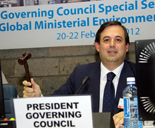Ministerial consultations during the 12th Special Session (GCSS-12/GMEF) focused on emerging policy issues under the overall theme of “The environmental agenda in the changing world: From Stockholm (1972) to Rio (2012).” In the 40th Anniversary Ministerial Statement, ministers welcome the UNCSD as a unique opportunity to address the economic, social, and environmental challenges in the context of sustainable development.
 22 February 2012: Delegates at the 12th Special Session of the UN Environment Programme (UNEP) Governing Council/Global Ministerial Environment Forum (GCSS-12/GMEF) focused on emerging policy issues under the overall theme of “The environmental agenda in the changing world: From Stockholm (1972) to Rio (2012).”
22 February 2012: Delegates at the 12th Special Session of the UN Environment Programme (UNEP) Governing Council/Global Ministerial Environment Forum (GCSS-12/GMEF) focused on emerging policy issues under the overall theme of “The environmental agenda in the changing world: From Stockholm (1972) to Rio (2012).”
GCSS-12/GMEF, which took place at the UN Office at Nairobi (UNON), Kenya, from 20-22 February 2012, brought together over 951 participants, representing more than 100 governments, as well as intergovernmental organizations, UN agencies, Major Groups and other stakeholders. It concluded with the adoption of decisions on: “UNEP at 40; ” International Environmental Governance (IEG); World Environment Situation; Sustainable Consumption and Production (SCP); consultative process on financing options for chemicals and wastes; enhancing cooperation and coordination with the chemicals and wastes cluster; budget and programme of work including financial and administrative arrangements between UNEP and the multilateral environmental agreements (MEAs); and enhanced coordination across the UN system, including the Environment Management Group (EMG).
During the event, delegates were also presented with the Global Environment Outlook (GEO-5) report summary for policy makers, which warns of the continued deterioration in the state of the global environment, highlighting that internationally-agreed environmental goals have only been partially met.
In the 40th Anniversary Ministerial Statement (UNEP/GCSS.XII/L.4), ministers congratulate UNEP on its successes, including: the establishment of MEAs; the development of environmental laws and policy; the findings of key scientific assessments; and stronger environmental awareness at all levels. Ministers recall previous commitments to strengthening the role of UNEP as the leading global environmental authority and advocate, as set out in the Nairobi Declaration of 1997, and recognize the GEO as an important synthesis of scientific information. Ministers pledge to: strengthen actions to reverse environmental degradation; promote a holistic approach to sustainable development; and contribute to the conservation of the essential natural resources and ecosystems. Ministers welcome the UNCSD as a unique opportunity to address the economic, social, and environmental challenges in the context of sustainable development.
Speaking after the conclusion of the conference, the current President of the UNEP Governing Council, Federico Ramos de Armas, State Secretary, Ministry of the Environment, Spain, noted that ministers and delegates viewed the green economy as a way to achieve sustainable development, poverty eradication and the creation of decent jobs “by increasing resource efficiency, supporting the shift to sustainable consumption and production patterns and facilitating low-carbon development.” He also noted concerns by some countries of the risk that a green economy might also lead to trade protectionism, and stressed the need for more engagement across all sectors of society and between countries to address these risks. The President’s summary also reflected the views of ministers and delegates responsible for the environment on the issue of IEG as part of the broader challenge of reforming the Institutional Framework for Sustainable Development (IFSD). He underscored that “While recognizing UNEP’s contribution to sustainable development, there is overwhelming support that urgent change is needed to the current system.”
Reflecting on the meeting, Achim Steiner, UNEP Executive Director, observed that environment ministers “have sent a clear signal to the Rio+20 summit – namely that there needs to be an urgent focus on scaling up implementation of sustainable development and that bold, transformative decisions need to be taken in four months’ time in Brazil.” [IISD RS Coverage of GCSS-12/GMEF] [UN Press Release] [UNEP Press Release][Sustainable Development Policy & Practice summary of GEO-5]